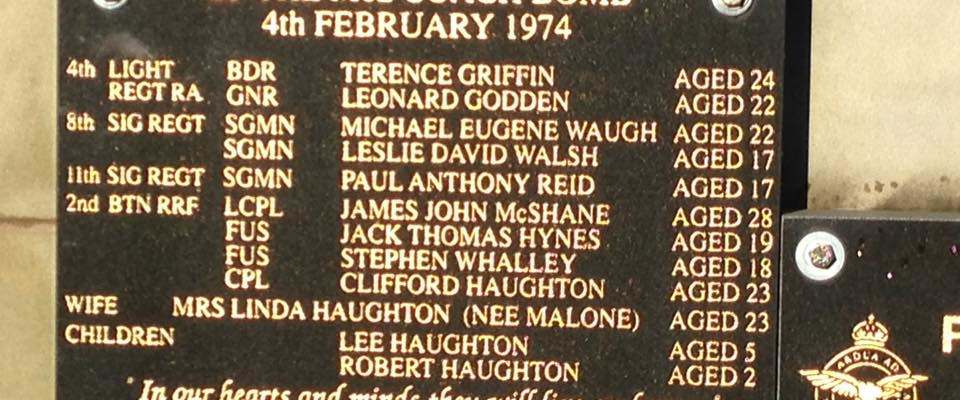The M62 coach bombing remembered
Reporter: Ruby Anstee
This Sunday sees the 44th year since the M62 coach bombing and a service is to be held at the Hartshead service station on the M62. The service area was near the site of the event and was used as a first aid station for those wounded in the blast.
Over three decades since, the annual service will be held in view of the memorial on the wall and beautiful oak tree on the westbound Harthead Moor service area of the M62 and will remember its victims.
It was February 4 1974 when an IRA bomb exploded in a coach carrying off-duty British Armed Forces personnel and their family members.
The coach had been specially commissioned to carry Army and RAF personnel on leave with their families from and to the bases at Catterick and Darlington during a period of industrial strike action on the trains. One of the families alighted the coach at Mumps roundabout in Oldham.
The vehicle had left Manchester and was travelling eastbound along the M62 in West Yorkshire when the bomb went off, just after midnight, near the Hartshead Moor service station.
Twelve people, nine soldiers and three civilians, were killed by the bomb, which consisted of 25 pounds (11 kg) of high explosive hidden in a luggage locker on the coach. Most of those aboard were sleeping at the time. The blast, which could be heard several miles away, reduced the coach to a “tangle of twisted metal” and threw body parts up to 250 yards .
The explosion killed eleven people outright and wounded over fifty others, one of whom died four days later. The explosion killed eleven people outright and wounded over fifty others, one of whom died four days later.
Amongst the dead were nine soldiers – two from the Royal Artillery, three from the Royal Corps of Signals and four from the 2nd battalion Royal Regiment of Fusiliers. The driver of the coach was injured by flying glass, but was hailed as a hero for bringing the coach safely to a halt. 
Following the explosion, the British public and politicians from all three major parties called for swift justice. The ensuing police investigation led by Detective Chief Superintendent George Oldfield resulted in the arrest of the mentally ill Judith Ward who claimed to have conducted a string of bombings in Britain in 1973 and 1974. She apparently married and had a baby with two separate IRA members.
Despite her later retraction of these claims, the lack of any corroborating evidence against her, and serious gaps in her testimony, she was convicted in November 1974.
Judith Ward was finally released in 1992, when three appeal court judges held unanimously that her conviction was “a grave miscarriage of justice”.



